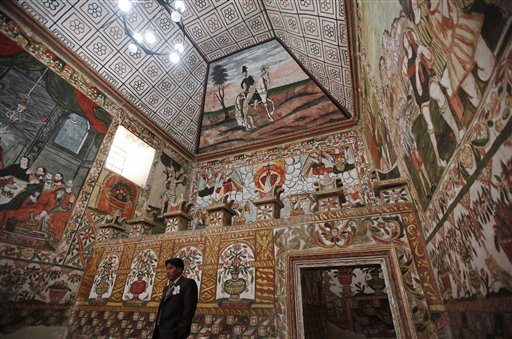Course Selection: Why you should consider taking AP European History

A groom waits for the bride before their wedding at the Sistine Chapel of Los Andes in Curahuara de Carangas, Oruro department, 260 km. (160 miles) south from La Paz, Bolivia, Saturday, Dec. 8, 2012. Although a far cry from the original Sistine Chapel at the Vatican, this small church, built in 1608 to evangelize indigenous Bolivians into the Roman Catholic faith, attracts both the faithful and tourists and it’s a popular choice for special religious services. (AP Photo/Juan Karita)
TOWAMENCIN — If you are a current Sophomore or Junior, it’s that time of the year again at North Penn where you have to select your courses for next year. Some majors you don’t have a say in like math and English, but that’s not the case for your science and history majors, where you the opportunity to select what the course focuses on throughout the year. For history specifically, you can take World History, AP World History, and/or AP European History. If you are torn between which course to take, I will tell you why you should take AP European History.
Before I get into my personal overview, here’s the course outline.
The course consists of a chronological study of European and world conditions from 1350 to the present. From the impact of the Black Death to the creation of the European Union, political and social developments throughout Europe will be addressed as well as the study of art and architecture in their specific time periods.
In addition to that, the development of European ideologies will be studied from conservatism and liberalism of the 18th and 19th centuries to Fascism and Communism of the 20th century. Other major topics covered in this course include the Renaissance—my personal favorite, the Protestant Reformation, French Revolution, the Industrial Revolution, World Wars I & II, and the Cold War.
“Regardless of where you or your ancestors emigrated from, all Americans are the inheritors of European history and culture. It is the story of how the medieval became the modern: agrarian towns became great industrial nation-states; superstition yielded to Western science and technology; tyranny of kings gave way to democratic liberalism. Additionally, European history is an epic drama of the most fascinating individuals: DaVinci, Galileo, Martin Luther, Louis XIV, Peter the Great, Napoleon, Marx, Hitler, Churchill, and Stalin” said North Penn History Teacher Eric Lorandeau.
Advanced Placement or AP classes can be intimidating to the naked eye, but I will be the first to tell you that it is really not that bad. I am a 5.0 level student, and I decided to take an AP class [Euro] for the first time in my junior year, and let me tell you, even though I am not doing as well as I hoped, AP Euro, is still my favorite class.
If you are not in an AP history class right now or have never been in one, you will agree with me in saying that in your current history class, you just sit there for 42 minutes and listen to your teacher present a PowerPoint presentation with little to no interaction, maybe the occasional question from a student, and then you go home to take constant notes. But in an AP environment, there is constant interaction between the students and the teacher.
If you’re a sophomore taking APUSH right now, you might be telling yourself that you barely survived half of the year and that you can’t imagine taking all of those notes again for another year but for a different topic. But fear not, yes, there is a workload for AP Euro, but don’t let that fool you. AP Euro doesn’t even consist of half the amount of note-taking that APUSH has.
Jane Peters, former APUSH student reflects on the main difference in the environment between APUSH and AP Euro.
“I feel like it’s [AP Euro] a little family, everyone is really friendly and close. APUSH was too much lecture for my preference and class time felt slow. The atmosphere was definitely too serious, AP EURO manages to bring in a friendly environment with constant communication throughout the class and learning at the same time,” said Peters.
“AP Euro has been by far the most informative and interesting history course I’ve ever taken. Instead of constantly taking notes and sitting through lectures, we engage in class discussions and videos. It’s an awesome class to be a part of,” said Junior Mary Forbes, my classmate.
Unlike many high school classes, AP Euro can help fuel your decision making in the future.
“Many students consider studying abroad while in college and taking European history would certainly give them a leg up. What they learn in class could help them decide if and where they’d like to study in Europe if given the chance,” concluded Mr. Lorandeau.
For more questions, you can reach out to Mr. Lorandeau in K130 or email him at lorandep@npenn.org


E. Frei • Jan 14, 2020 at 9:36 am
This is a fantastic article about AP Euro. Due to just this VERY article and nothing else alone, every sophomore should consider taking it! Good job, Jo!